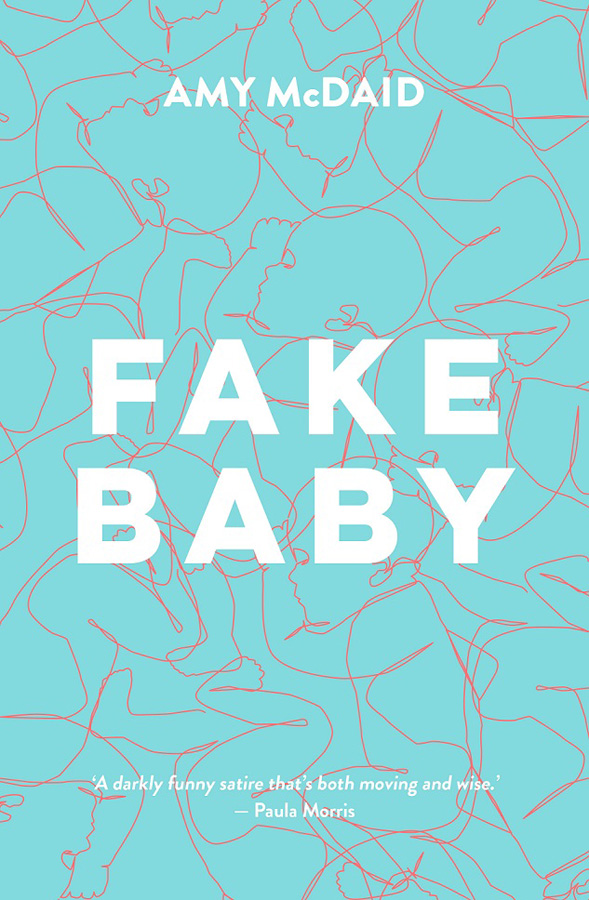The fake baby of this novel’s not-messing-about title is, as is quickly made clear, no ordinary doll. A newspaper report notes when it’s stolen from a lingerie store by Jaanvi Gilfillan:
‘Valued at over $5,000, it was hand-painted by American reborn artist Genevieve Lusk in an extremely lifelike manner to resemble a real infant.’
Why would anyone steal a silicone doll, let alone dress it in baby clothes, caress it lovingly, take it for walks?
The bereaved. Jaanvi is in deep mourning for the son she and husband Mark lost after just a few days. Anyone whose baby has died or even – I use the word advisedly – suffered a miscarriage knows the emotional devastation it can wreak. Such a loss leaves a gap that needs to be filled. Still, these dolls – widely known as reborns and which are available for “adoption” – are, to outsiders, seriously creepy. Some are even created from 3D scans of live newborns. Mark, an aloof and irksomely rational accountant (and gym bunny), is seriously spooked by his wife’s actions, though it manifests, as it sometimes does, as anger and rejection.
Jaanvi knows that the doll is made of plastic, at least on some level.
‘Look, Ayla, James’s been helping me – I mean, I know he’s not real, I’m not deluded, but to have him with me and pretend, it’s like being in a play. Remember when we were in that play? I was a tree and you were Little Red Riding Hood.’
‘How old were we?’
‘Maybe ten or eleven.’
Yet moments later she’s imagining Mark with James in the front pack, thanking her for bringing so much joy back into his life. Like everyone, Jaanvi has holidays from reality. Hers are just a little further afield. We are all capable of self-deception and the line between mental anguish and mental illness is sometimes slim, author Amy McDaid reminds us. Who among us hasn’t had intrusive thoughts and considering escaping all the unwanted attention by camping in a farmer’s field, digging a toilet and having only cows and roosters for company?
In fact, the book opens with Stephen, an itinerant with a penchant for mumbling rhymes and free-associative jabber and a far looser grip on reality than Jaanvi. He’s doing unbecoming things in Waikumete Cemetery, after visiting the grave of his murdered father. Then there’s Lucas Trout, the pharmacist with the Vonnegutian moniker and a fretful, down-at-the-mouth disposition, his volatile band of workers, and a mother who’s wildly bipolar.
Yes, troubled minds run through the book. But in amongst the grief and pain is a lot of humour, dry and well-observed, about relationships and society’s tutting expectations.
‘Should I wave them over?’
‘No! No, of course not. My god, Jaanvi. I’m out for a meal, the last thing I want to do is talk to people.’
The scene where Jaanvi — whose name is Indian though she isn’t; her mother is Rarotongan – goes on a regular walk with her sister and irrepressible mother through Auckland’s Victoria Park is a highlight.
It’s a confidently Auckland novel. Trout’s pharmacy is near K Rd, certainly the most interesting street in the country, and Stephen’s wanderings take him through the city’s patchwork of parks, to places and spaces off the beaten track, not least the Green Bay foreshore. It embraces the city’s real diversity, characters’ ethnic backgrounds, for instance, often only becoming apparent after we’ve met them.
With three main characters there is quite a lot of plot, even if not much actually goes on, and it propels us along speedily with just a little dropping back and forth in time over the course of nine days. McDaid is clearly enjoying the creative freedom that madness offers authors, but aware of the accompanying responsibility, the danger of seeming to make fun of it. For a first novel, Fake Baby gets a great deal right. For me, the plates do start to wobble a little as the novel approaches its end. The book’s symbolism feels a smidgeon overdone, and you start to wonder if it really needed so many troubled characters. What’s real and what’s imagined also becomes a question when we are spending so much time inside paranoid heads. Do Stephen’s ramblings offer a clear window into past events, or are they random delusions? Some will appreciate not knowing, but sometimes it’s helpful to be sure.
There’s a ton of insight and authenticity here. McDaid is a neonatal nurse, so moments in NICU and a psychiatric hospital smell kosher, and she knows her carvedilol from her sildefanil. Did I mention it’s funny? That gets a giant tick for me. You can feel the author not quite able to resist her chafings, characters being rude about drivers using mobile phones, The Chaser, Facebook obsessives, grammar. I agreed entirely. The novel is fascinated with word play, and the text bubbles with references to random fascinations like spontaneous combustion and whether women in burkas wear nice lingerie. And there are splendid lines.
‘Little pieces of ice from her chest migrated to her eyes and sat there, doing nothing.’
The plates stay up, and all the strands come together in a way that’s not too neat. Redemption? You’d like to hope so. After all, a fake baby is not only a symbol of grief but also of healing. Even if it’s tempered by the hard reality that life, with all its jostling vicissitudes and imperfections, goes on.
This review was originally published on the Academy of NZ Literature site.



